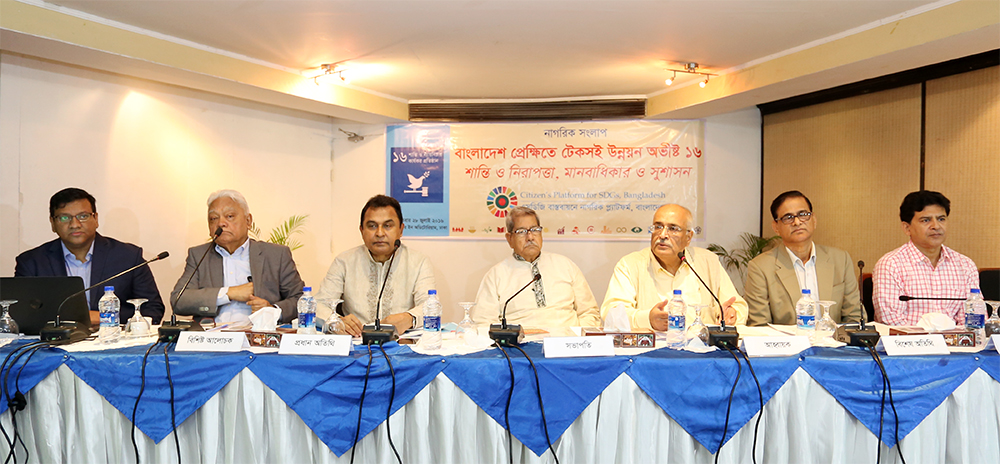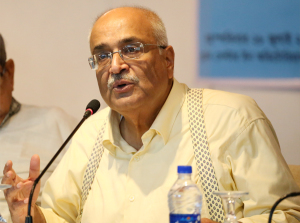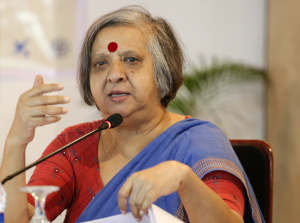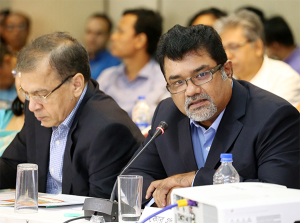
Bangladesh achieved remarkable success in the Millennium Development Goals (MDGs). Following the trail of success it is high time now for the country to formulate a comprehensive national strategy towards achieving the Sustainable Development Goals (SDGs). This comprehensive national strategy should be formulated through a participatory process so that all stakeholders can contribute to the country’s journey towards attaining SDGs.
Among the 17 goals of the 2030 Agenda for Sustainable Development, the Goal 16: Peace, Justice and Strong Institution is critical to achieve rest of the goals. The government needs to concentrate on ensuring good governance, accountability and independent flow of information for a smooth implementation process. Otherwise, it would be difficult to attain the ambitious goals of SDGs within the given timeframe.
 These views emerged from a citizen dialogue titled SDG 16 in the Bangladesh Context: Peace and Security, Human Rights and Governance organised by the Citizen’s Platform for SDGs, Bangladesh at BRAC Centre Inn Auditorium on Thursday 18 July 2016. The Platform is an initiative of more than thirty civil society organisations to contribute to the delivery of the SDGs adopted by the United Nations under the 2030 Agenda for Sustainable Development. The Centre for Policy Dialogue (CPD) is acting as the Secretariat of the Platform.
These views emerged from a citizen dialogue titled SDG 16 in the Bangladesh Context: Peace and Security, Human Rights and Governance organised by the Citizen’s Platform for SDGs, Bangladesh at BRAC Centre Inn Auditorium on Thursday 18 July 2016. The Platform is an initiative of more than thirty civil society organisations to contribute to the delivery of the SDGs adopted by the United Nations under the 2030 Agenda for Sustainable Development. The Centre for Policy Dialogue (CPD) is acting as the Secretariat of the Platform.
 While presenting the keynote paper on the subject CPD Research Fellow Mr Towfiqul Islam Khan focused on challenges for Bangladesh to achieve the SDGs. He identified five challenges in Bangladesh’s journey to meet the SDGs- adapting conceptual clarification; developing institutional capacity; availability data and information; ensuring accountability and participation; and political will. He also noted that it is a good sign that the government has revised the Seventh Five Year Plan (7FYP) in alignment with some of the targets of the SDGs. However, we need to develop a comprehensive national strategy and action plan for effective implementation of the SDGs, said Mr Khan.
While presenting the keynote paper on the subject CPD Research Fellow Mr Towfiqul Islam Khan focused on challenges for Bangladesh to achieve the SDGs. He identified five challenges in Bangladesh’s journey to meet the SDGs- adapting conceptual clarification; developing institutional capacity; availability data and information; ensuring accountability and participation; and political will. He also noted that it is a good sign that the government has revised the Seventh Five Year Plan (7FYP) in alignment with some of the targets of the SDGs. However, we need to develop a comprehensive national strategy and action plan for effective implementation of the SDGs, said Mr Khan.
Convenor of the Citizen’s Platform for SDGs, Bangladesh Dr Debapriya Bhattacharya, Distinguished Fellow of the CPD, termed the Goal 16 as the Jewel in the Crown. The success in achieving this goal will glorify the success for other goals and, at the same time, the loss of the crown will affect the entire implementation process, he added.
Speakers at the event also emphasised on raising more awareness, developing institutional capacity and generating social demand for proper implementation of the SDGs.
Distinguished Discussant Mr Syed Manzur Elahi, Former Advisor to the Caretaker Government and Chairman, Apex Group, emphasised on ensuring accountability and reducing corruption as pre-requites to bring peace and justice in the society. In this connection he urged for creating more employment opportunities in the country, and to do so, he asked for developing necessary infrastructures and facilities for an investment-friendly environment.
 Speaking as the Special Guest Dr Shamsul Alam, Member, General Economics Division, Planning Commission, Government of Bangladesh (GoB), mentioned about institutional coordination among all the government agencies in keeping the implementation process on track. The government has already assigned the ministries with relevant goals and targets of the SDGs, and provided necessary instructions to prepare necessary action plan for implementation, he informed.
Speaking as the Special Guest Dr Shamsul Alam, Member, General Economics Division, Planning Commission, Government of Bangladesh (GoB), mentioned about institutional coordination among all the government agencies in keeping the implementation process on track. The government has already assigned the ministries with relevant goals and targets of the SDGs, and provided necessary instructions to prepare necessary action plan for implementation, he informed.
Mr A H M Mustafa Kamal, FCA, MP, Hon’ble Minister for Planning, GoB, present at the dialogue as Chief Guest said that the government is committed to timely delivery of SDGs. He emphasised on a comprehensive reform process at all of the government agencies to reduce institutional corruption in the country. Putting emphasis on ensuring inclusiveness and accountability the government will coordinate with its stakeholders in delivering SDGs, he said.
Ms Khushi Kabir, Coordinator, Nijera Kori, and Dr Hossain Zillur Rahman, Former Advisor to the Caretaker Government and Executive Chairman, Power and Participation Research Centre (PPRC), also delivered their views as Distinguished Discussants of the dialogue.
The dialogue was also attended by the Core Group Members of the platform, government officials, bureaucrats, diplomats, development practitioners, trade leaders, economists, environmentalists, human rights activists, journalists among others.


